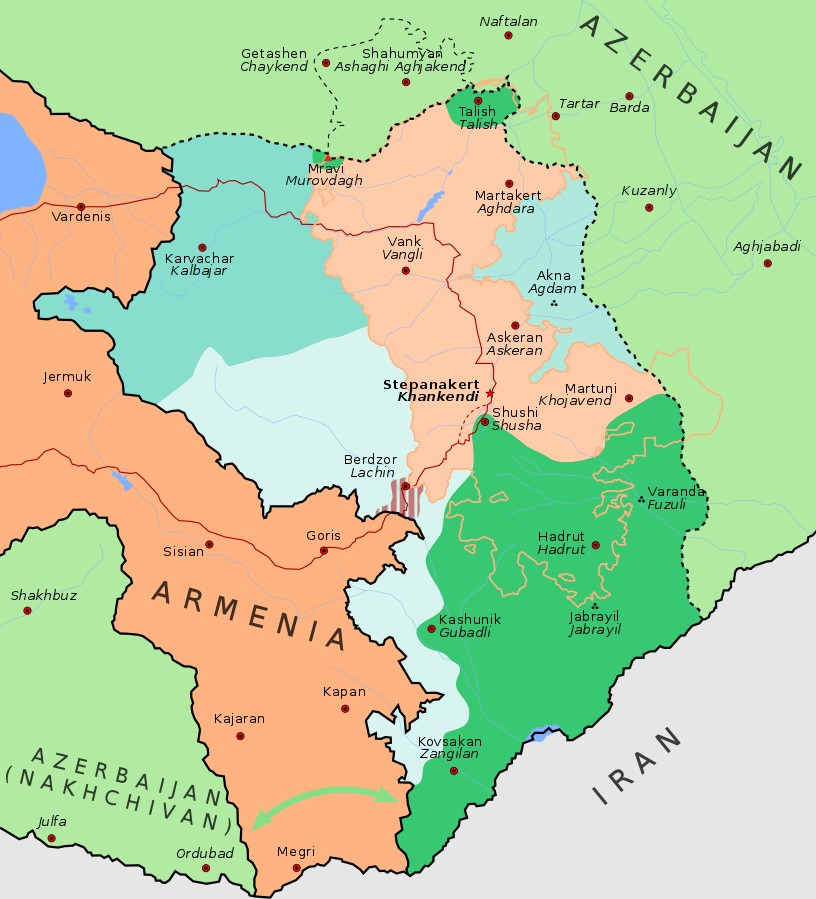An Accounting For Armenia
Alberto M. Fernandez/MEMRI/December 07/2020
البرتو فرننادس/ميمري: جردة حسابية لأرمينيا
Exactly a century ago, a victorious Turkey imposed a draconian peace on a prostrate Armenia. On December 3, 1920 Armenia signed the Treat of Alexandropol, officially surrendering a large swathe of what is now northeastern Turkey that had been awarded to the Armenians by the allies. The treaty was signed by the foreign minister of an Armenia that had ceased to exist, as the previous day the Bolsheviks had taken power. Armenia would be under the Soviet yoke until 1991.
Turkey was one of the losers of the First World War, surrendering most of its Middle East empire, but it did quite well in a series of post-war conflicts from 1919 to 1923. With the victorious Western allies either exhausted or distracted, the so-called Turkish War of Independence saw Turkish nationalists under Mustafa Kemal Atatürk defeat the Armenians in the East, the French in the South, and the Greeks in the West.
In recognition of the suffering of the Armenians during the genocide inflicted on them in the First World War, the Western powers decided that there should be an Armenian state. It was actually proposed that the new Armenia be under American mandate, and the new state’s borders were drawn by U.S. President Woodrow Wilson.[1]
The same King-Crane Commission that recommended an independent Arab Kingdom in Syria proposed a larger Armenian state stretching from current-day Armenia to the Black Sea. [2] In the end, an isolationist U.S. Senate rejected accepting a mandate over Armenia.[3]The victors of American diffidence were both Turkey and Russia. The great losers were the Armenians, who not only lost territory which encompassed part of historic Armenia but were subject to decades of oppressive Soviet Russian rule.
A century later the parallels are eerie. A short bloody war in late 2020 with Azerbaijan, heavily supported by an irredentist Turkey, leads to the defeat of the Armenians of Artsakh (Nagorno-Karabakh) and the loss of more territory.[4]
A draconian ceasefire agreement, brokered by Russia, is grudgingly signed by the Armenians. As in 1920, the Armenians sign because they know that if they don’t, they might lose even more of what little remains in their hands.[5]
Two thousand Russian soldiers are to secure the uneasy peace for a minimum of five years, a period which can be extended unless either Armenia or Azerbaijan gives six months’ notice that it is to be terminated. While the results of the war seem to confirm it as another of those Russian “frozen conflicts,” conceivably, in about four and a half years, one of the parties could give notice that the armistice is ended and open conflict could again resume.[6] Certainly the triumphalist rhetoric from Baku indicates a lust for even more conquest.[7]
Is there anything for the United States of America to do in such a situation? The conventional answer is, not much. The U.S. has been a member of the often-hapless Minsk Group charged with finding a solution to the Nagorno-Karabakh issue since 1992, but America will never match the attention and intensity that other players – Russia, Turkey, and, of course, Azerbaijan and Armenia – bring to the table.
Ironically, the roots of the 2020 Russian-imposed ceasefire agreement are American. This is a version of the old “Goble Plan,” named for former U.S. diplomat Paul Goble, who suggested mutual recognition of an Azerbaijan land bridge across southern Armenia to the Azeri enclave of Nakhichevan coupled with a corridor at Lachin connecting Nagorno-Karabakh with the Republic of Armenia.[8] The concept was actually floated as part of a peace deal by Azerbaijan’s then-president, the veteran KGB Gen. Heydar Aliyev (father of Azerbaijan’s current dictator) more than 20 years ago, but proved to be too cynical or forward leaning for his own regime.
As Turkish president Erdoğan’s lapdog media made abundantly clear, one of the losers in this sharp brutal conflict was the “pro-Armenian West.” Turkish media played up both Turkey and Russia, along with Azerbaijan, as the winners: “All pro-Armenian states can be counted among the losers of the war as well. Among them, the Western countries come first… Especially, the United States and France, the most pro-Armenian countries in the West.”[9]
In a more just world, the remaining Nagorno-Karabakh territory in local Armenian hands, along with the Lachin corridor, would become an integral part of the Republic of Armenia, borders would be formalized, and both Azerbaijan and Armenia would prioritize the essential job of building up their own states that are beset by a myriad of social and economic ills. But what may be just is often inconceivable. While dysfunctional dictatorship Azerbaijan is flush with oil wealth, Armenia is a country whose population census is treated as a state secret because its dire economic situation continues to lead to the flight of those able and talented enough to emigrate.
U.S. policy has been, even before President Trump, leaning towards Azerbaijan, driven by the twin magnets of Baku’s oil wealth and the tempting concept of “encircling” Russia with a string of pro-Western anti-Russian states. During the U.S. presidential campaign, Democratic candidate Joe Biden issued a position paper outlining a greater emphasis on helping Armenians in both Armenia and Nagorno-Karabakh.[10]
Campaign promises should, of course, be taken with a grain of salt. The U.S. doesn’t have the attention span to work to detach Armenia fully from the Russian sphere of influence (Russia also seeks to expand its influence in both Turkey and Azerbaijan) even if it tried. With so many hotspots and crises elsewhere, and with the fait accompli caused by the latest war, the Southern Caucasus is just not going to be an American priority.
But there is some room for an American policy towards Armenia that has clear and humble goals seeking to strengthen the capacity of this ancient Christian people to remain rooted and flourish in their homelands. That should be the focus. U.S. policy towards an aggressive Turkey obsessed with lebensraum is also ripe for an overdue course correction.[11] Making it clear to Erdoğan that America has interests in the survival and flourishing of the Armenians in the Caucasus (and in the territorial integrity of Greece and Cyprus) would be a very good early message to send.
As for victorious Azerbaijan, a smart American policy would seek renewed positive engagement, while at the same time quietly warning against renewed military hubris and especially against incitement and an orchestrated campaign of erasing Armenians from history and from the region.[12]
*Alberto M. Fernandez is Vice President of MEMRI.
[1] Woodrowwilson.org/blog/2019/12/19/armenia, December 19, 2019.
[2] Dcollections.oberlin.edu/digital/collection/kingcrane/id/2902/rec/1, August 1919.
[3] Nytimes.com/1920/06/02/archives/senate-rejects-mandate-52-to-23-thirteen-democrats-vote-with.html, June 2, 1920.
[4] Caucasuswatch.de/news/3306.html, December 3, 2020.
[5] Armenianweekly.com/2020/11/23/putin-armenia-not-recognizing-artsakh-was-a-significant-factor, November 23, 2020.
[6] Warsawinstitute.org/post-soviet-frozen-conflicts-challenge-european-security, March 14, 2019.
[7] Dailysabah.com/politics/diplomacy/azerbaijans-aliyev-vows-to-revive-liberated-nagorno-karabakh, November 26, 2020.
[8] Haberturk.com/son-dakika-turk-dunyasi-icin-onemli-gelisme-nahcivan-dan-azerbaycan-a-koridor-haberler-2865989, November 11, 2020.
[9] Dailysabah.com/opinion/columns/pro-armenian-west-is-net-loser-of-2nd-karabakh-war, November 18, 2020.
[10] Armradio.am/2020/10/17/joe-biden-pledges-to-recognize-armenian-genocide-push-for-lasting-peace-in-the-region, October 17, 2020.
[11] Nordicmonitor.com/2020/02/erdogans-secret-keeper-says-lausanne-treaty-invalid-turkey-free-to-grab-resources, February 24, 2020.
[12] Evnreport.com/spotlight-karabakh/christianity-in-karabakh-azerbaijani-efforts-at-rewriting-history-are-not-new, November 22, 2020.



















